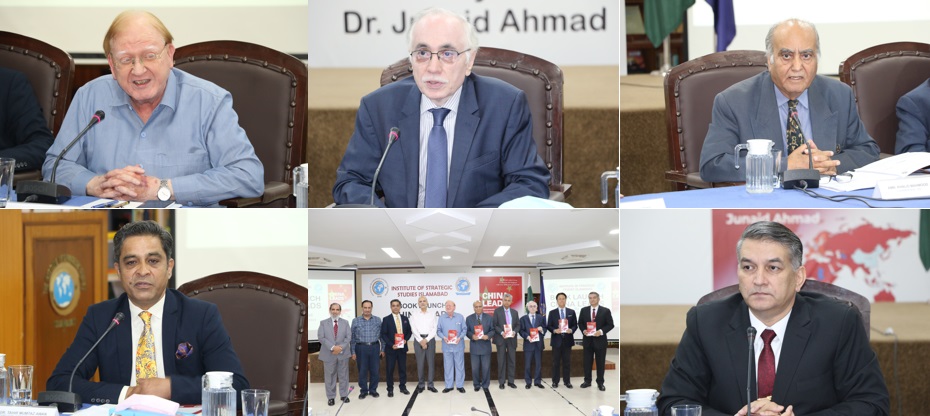 September 24, 2024, Islamabad: The Institute of Strategic Studies Islamabad (ISSI) organized the launch of China Leads by Dr. Junaid Ahmad. The book was reviewed by eminent scholars, including Ambassador Masood Khalid, former Ambassador of Pakistan to China, and Dr. Tahir Mumtaz Awan, former Director of the China Study Centre, COMSATS University Islamabad.
September 24, 2024, Islamabad: The Institute of Strategic Studies Islamabad (ISSI) organized the launch of China Leads by Dr. Junaid Ahmad. The book was reviewed by eminent scholars, including Ambassador Masood Khalid, former Ambassador of Pakistan to China, and Dr. Tahir Mumtaz Awan, former Director of the China Study Centre, COMSATS University Islamabad.
Ambassador Masood Khalid praised the book for offering a rich historical context on China’s rise, from its ancient civilization to its modern achievements under the Communist Party of China. He highlighted the book’s insights on socio-economic development, and its pivotal role in global politics. He praised the book’s detailed historical account, covering dynastic periods, China’s modernization under Mao Zedong, and its current trajectory under President Xi Jinping. The book offers valuable insights into China’s modernization efforts, poverty alleviation, and its strategic foreign relations, making it an essential resource for researchers and policymakers. He also suggested future editions should include discussions on China’s Global Development, Security and Civilization Initiatives, further enhancing the book’s relevance. Ambassador Khalid also commended the detailed research, making the book a valuable resource for those interested in China’s history, foreign policy, and future direction.
Dr. Tahir Mumtaz Awan commended the book for its comprehensive account of China’s rise as a global leader, not only economically, but also culturally, geopolitically, and ideologically. He highlighted the book’s historical insights, China’s strategic use of soft power, and its impact on global perceptions, particularly regarding the China-Pakistan Economic Corridor (CPEC).
Dr. Junaid Ahmad, the author of the book stated that China Leads emphasizes that the Chinese civilization and language embody wisdom and knowledge accumulated over 5,000 years. Throughout its history, China has neverbeen an aggressor. It has only defended itself against numerous aggressors. Chairman Mao laid the foundation for China’s global stature by making it a nuclear power in 1964. His successors, starting with Deng Xiaoping, guided China towards a market economy, with leaders like Xi Jinping continuing this trajectory, positioning China as a global leader in various fields.
Earlier in his remarks, Dr. Talat Shabbir, Director of the China Pakistan Study Center at ISSI, welcomed the audience, describing the book as a timely and insightful work on China’s journey of leadership, innovation, and peace. He emphasized China’s transformation from a nation to a global leader in economics, technology, and diplomacy, and highlighted the book’s comprehensive narrative on China’s rise and its contributions to global development.
Ambassador Khalid Mahmood while giving concluding remarks highlighted China’s remarkable journey since 1949, driven by Confucius philosophy and consistent leadership under the Communist Party. He emphasized China’s role as a stabilizing force in the emerging global order, promoting multilateralism and win-win cooperation. He contrasted China’s policies of mutual respect with Western unilateralism, noting China’s alignment with the developing world.
The event was attended by a large number of academics, scholars, diplomats, government officials and members of civil society.
Sub Editor: Ghufran